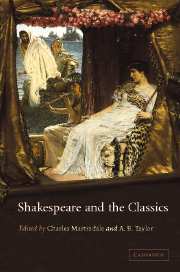Introduction
Published online by Cambridge University Press: 22 September 2009
Summary
In his own terms, Ben Jonson was right to remark on his friend's ‘small Latine & lesse Greek’, for to his eyes a grammar-school education, which may have been incomplete, had clearly left Shakespeare an ill-equipped classicist. If Shakespeare considered it necessary, he could read Latin texts: writing The Rape of Lucrece for the Earl of Southampton, he apparently studied the relevant section of Ovid's Fasti and also consulted the Latin notes by Paul Marsus in the standard edition; and for The Comedy of Errors, for a highly literate audience at the Inns of Court, he seems to have made extensive direct use of Plautus' Menaechmi, still untranslated at the time. But it is no coincidence that he could have studied both these works in school. In terms of the authors he used, Shakespeare seldom moved beyond the grammar-school ambit, and even within that ambit, perhaps partly because reading Latin texts clearly involved some effort, he habitually had recourse to available translations. For example, for his favourite Latin work, Ovid's Metamorphoses, parts of which he demonstrably knew well in the original, he also constantly used Arthur Golding's translation, as well as occasionally dipping into other partial versions such as that provided by Abraham Fraunce in Amintas Dale. There is no evidence that his ‘lesse Greek’ (whatever quite that may mean) enabled any approach to texts in that language; the only Greek author he used heavily, Plutarch, paradoxically for his Roman plays, was accessed via an English translation of a French translation of the Greek text.
- Type
- Chapter
- Information
- Shakespeare and the Classics , pp. 1 - 6Publisher: Cambridge University PressPrint publication year: 2004

